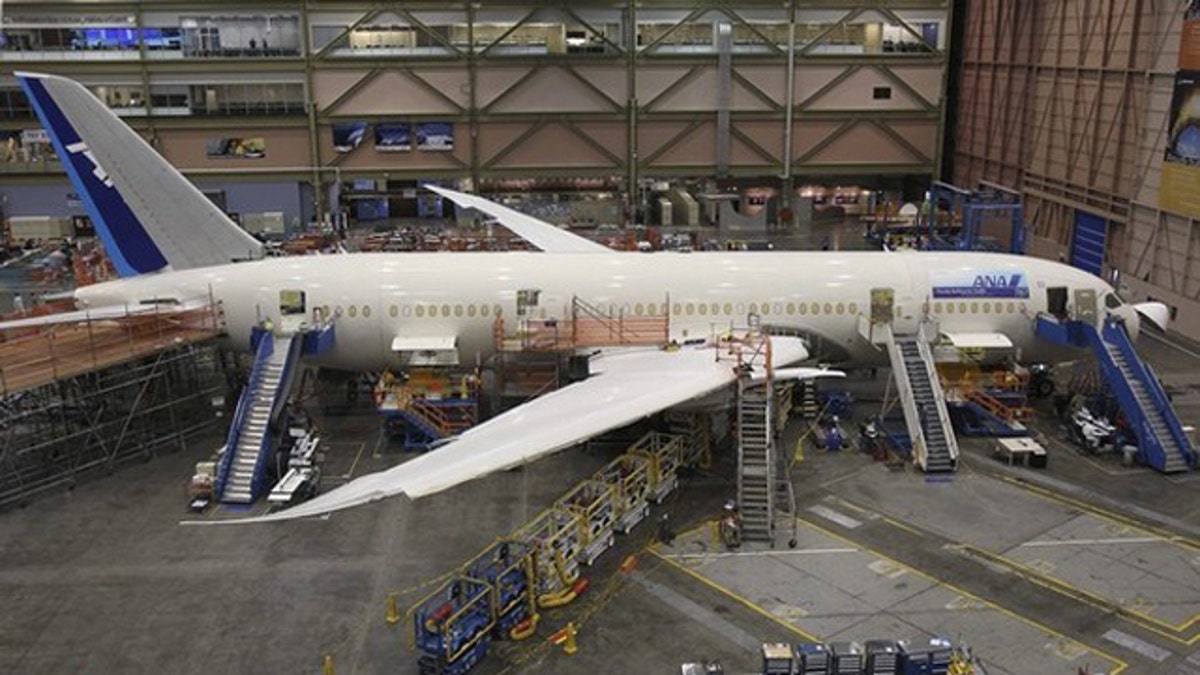
A Boeing 787 Dreamliner is seen on the production line at Boeing's Commercial Airplane manufacturing facility in Everett, Wash. (AP)
In a scalding letter, Boeing called on the federal labor board to withdraw its complaint accusing the aerospace giant of retaliating against a local union by opening a production line at a non-union site.
The letter, obtained by FoxNews.com, accused the National Labor Relations Board of misquoting Boeing executives in the course of building its case and called on the board to correct the record.
"Through these misquotations and mischaracterizations, you have done a grave disservice to The Boeing Company," Executive Vice President J. Michael Luttig wrote in the letter Tuesday to the NLRB general counsel.
The NLRB attorney last month filed the complaint which generated a storm of controversy, particularly in South Carolina where Boeing is slated to open its second 787 Dreamliner airplane production line.
The complaint hinged on claims that Boeing made "coercive statements" regarding union-led strikes, and then retaliated by transferring its second line to the non-union facility. As evidence, the NLRB noted that a Boeing executive said in an interview that an overriding factor in going to South Carolina -- a right-to-work state where unions cannot force employees to join -- was a desire to avoid disruptions. The union in Washington state has led several strikes against Boeing since the 1970s, most recently in 2005 and 2008.
But Boeing took issue with the NLRB's claims. First, Luttig refuted the allegation that Boeing decided to "transfer" work away from Washington state.
"No work -- none at all -- was 'removed' or 'transferred' from Puget Sound," he wrote. "The second line for the 787 is a new final assembly line."
Luttig also took issue with a comment an NLRB spokeswoman made to FoxNews.com last week. She had said the charge that Boeing is transferring work away from union employees stems from the company's original commitment "to the state of Washington that it would build the Dreamliner airplanes in that state."
That assertion, Luttig said, is "false." He also said the NLRB has not provided evidence that Boeing acted to "punish" its workers.
But NLRB General Counsel Lafe Solomon originally cited Boeing executives' comments on their desire to avoid strikes in claiming the company violated federal rules.
"A worker's right to strike is a fundamental right guaranteed by the National Labor Relations Act," Solomon said in a statement. "We also recognize the rights of employers to make business decisions based on their economic interests, but they must do so within the law."
Solomon noted that a settlement could still be reached.
The International Association of Machinists and Aerospace Workers, which initially filed the allegation against Boeing with the NLRB in March of last year, said in a statement that the South Carolina decision was aimed at the union.
The NLRB complaint prompted outrage among South Carolina lawmakers. Sen. Jim DeMint called it a "political favor" for the unions who supported President Obama's 2008 campaign.
A hearing in the case is scheduled before an administrative law judge on June 14 in Seattle.












































